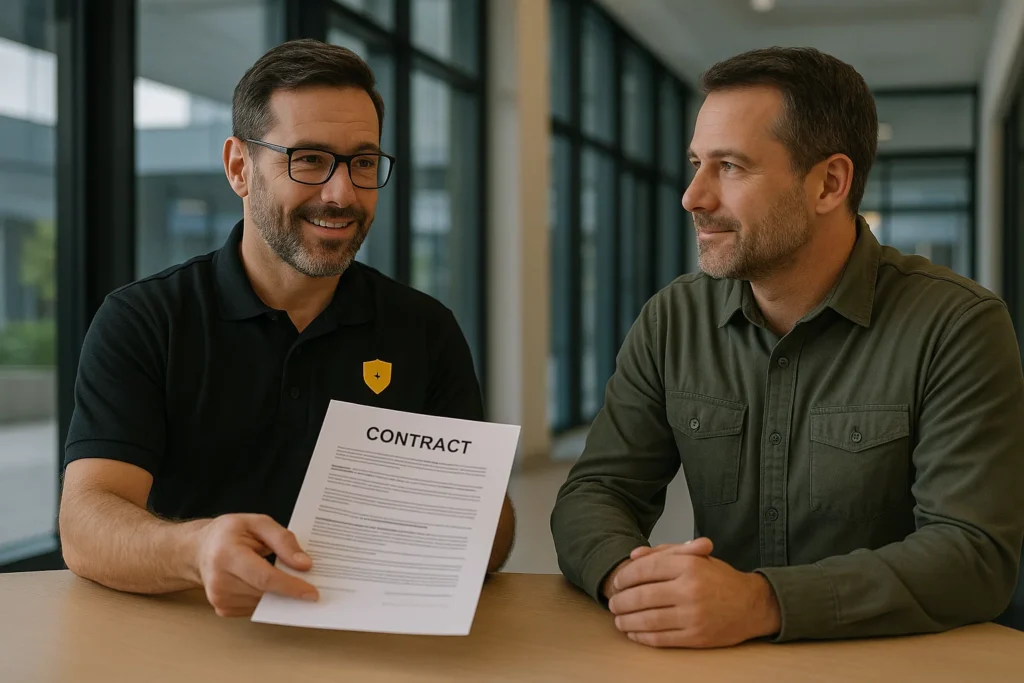Introduction: So, You Want to Start a Security Business?
Maybe it started with a late-night thought. Or maybe you’ve been eyeing that sluggish 9-to-5 and thinking, “Surely there’s something better?” Whatever sparked your curiosity, starting a security business is a bold and smart move — especially now.How to Start a Security Business
Let me be real with you from the jump. This industry isn’t for the lazy or unprepared. It’s not glamorous like the movies either — there are no slow-motion chase scenes or sunglasses-at-night montages. But what it does offer is consistency. A solid market. Real income. And the kind of independence that feels good when your business name is on the side of a patrol car.How to Start a Security Business
This guide? It’s everything I wish someone handed me when I started helping folks launch security businesses. It’s part blog, part blueprint, written like we’re sitting at a café table talking shop.How to Start a Security Business
Why Start a Security Business in 2025?
Security isn’t a trend — it’s a need. And needs don’t go out of style.How to Start a Security Business
Right now, the private security industry is experiencing major growth. Remote working may be in vogue, but people still need guards on-site. Malls still want patrols. Events need crowd control. Residential buildings want someone to nod at on their way in. Companies need peace of mind. And all of this creates opportunity.How to Start a Security Business
A few powerful reasons why this business still makes sense:
- Recession-resistant — even when budgets tighten, people still invest in safety.
- Scalable — start solo, expand to teams.
- Recurring income — contracts often roll month-to-month.
- Low startup costs compared to many other industries.
That’s the promise. But now let’s get into the real work.

Step 1: Choose Your Niche (Don’t Try to Do It All)
Before anything else, you need to choose what kind of security business you’re starting. Not all security work is the same, and the type you choose determines your licenses, startup costs, gear, and target clients.How to Start a Security Business
Here are the main categories:
- Unarmed Guards: Basic access control, building monitoring, malls, lobbies, etc. Lower risk, easier to license and insure.How to Start a Security Business
- Armed Guards: Higher liability, but higher pay. Best for banks, VIP protection, and government contracts. Requires special licensing.
- Event Security: Temporary contracts for concerts, parties, sports, conventions. Fast-paced, often night work.
- Mobile Patrols: Guards drive around neighborhoods or industrial areas in marked vehicles. Great for HOAs, warehouses, and campuses.
- Alarm Response/Monitoring: Tech-based services where you respond to triggered alarms or even set up monitoring centers.
- Executive Protection: Elite services — bodyguards, secure transport, discretion. Requires significant training and background.How to Start a Security Business
The more focused you are, the easier it is to create systems, branding, and a marketing plan that speaks to the right people.
Step 2: Make It Legal — Business Structure & Licenses
This isn’t a t-shirt brand. You’re dealing with liability, safety, and serious trust. That means paperwork. But don’t worry — once it’s done, it’s done.How to Start a Security Business
Choose Your Business Structure
- Sole Proprietorship: Fast and easy, but not recommended. Offers no personal liability protection.
- LLC (Limited Liability Company): Perfect for most. Affordable, simple, and protects your personal assets.
- Corporation: For large teams or businesses seeking investment. More complex to run.
Licensing: Get Legal or Get Shut Down
Depending on your country or state, you’ll likely need:
- Business license (basic registration for any legal operation)
- Private Patrol Operator License or Security Company License
- Guard Cards or individual guard licensing
- Weapons permits (if offering armed services)
- Vehicle registration (if using patrol vehicles)
Check your local Private Security Bureau or licensing authority. Every region is different, and skipping this step can get you shut down fast.How to Start a Security Business
Step 3: Insurance — The Silent Safety Net
Let’s talk about protection — not for clients, for your business. One mistake on a job and a lawsuit can ruin you if you’re not covered.How to Start a Security Business
You’ll likely need:
- General Liability Insurance — protects you if a guard accidentally harms someone or damages property.
- Workers’ Compensation — mandatory in most places if you hire employees.
- Professional Liability (Errors and Omissions) — covers negligence or legal missteps.
- Auto Insurance — if you have patrol vehicles.
- Bonding — often required for certain contracts; shows you’re financially accountable.
Pro tip: talk to a broker who specializes in security business coverage. Don’t cheap out here.
Step 4: Create a Business Plan (Yes, You Still Need One)
No, it’s not just for banks or investors. Your business plan is the GPS for your company. You don’t need a 50-page corporate report — just a clear, readable layout of where you’re headed.
Your plan should include:
- Services you offer
- Ideal client profile
- Competitive pricing strategy
- Startup costs and income projections
- Marketing tactics (more on that soon)
- Hiring plan (even if it’s just you right now)
- Goals for 6, 12, and 24 months
Think of it as your script. Businesses without a plan are winging it — and clients can tell.
Step 5: Budget and Startup Costs — Let’s Talk Numbers
You don’t need a million dollars to start. In fact, if you start solo and unarmed, you can launch on a tight budget.
Here’s a rough estimate for year one:
| Item | Cost Range |
|---|---|
| Licensing & Legal Fees | $500 – $2,000 |
| Insurance | $1,500 – $5,000 |
| Uniforms & Gear | $300 – $800 |
| Patrol Car (used) | $5,000 – $10,000 |
| Radios/Phones | $300 – $700 |
| Website & Branding | $500 – $2,000 |
| Marketing Materials | $300 – $1,000 |
Total Range: $8,000 – $20,000
Starting with event security or night patrols on foot? You could be up and running for much less.

Step 6: Branding — Your Reputation Starts Before You Speak
Branding isn’t just a logo — it’s the feeling people get when they see your uniform, your website, or your security truck. It should shout: “We know what we’re doing.”How to Start a Security Business
What You Need:
- Business Name: Keep it professional. Names like “Shadow Sniper Security” don’t land corporate clients. Try “Sentinel Security Group” or “Fortress Watch Services.”
- Logo: Hire someone or use a premium template, but make it sharp and scalable.
- Colors & Fonts: Dark blue, grey, black, white — serious colors only.
- Uniforms: Clean, matching, non-aggressive. Make your team look sharp.
- Website: Mobile-friendly, clear services, testimonials, and an easy contact form.
A strong brand makes a small company look ten times more trustworthy.

Step 7: Marketing — How to Get Your First Clients
Alright, it’s go-time. No matter how polished your operation is, without clients, you’ve got a hobby, not a business.
Tactics That Actually Work:
1. Local SEO and Google Business Profile
Set up a Google Business Profile and optimize it. Add real photos, services, and service areas. Encourage reviews after every job.
2. Direct Outreach
Call or visit:
- Apartment complexes
- Event venues
- Office buildings
- Warehouse districts
- Construction companies
Leave flyers or offer a free walk-through assessment. People remember face-to-face interactions.
3. Networking
Join local business chambers, real estate groups, or facility manager meetups. Talk less, listen more. Be memorable.
4. Partnerships
Team up with alarm companies, property managers, and event planners. Offer commission or referral fees.
5. Social Media (Keep It Classy)
Post about your team, training, new contracts, community events. Keep it clean and professional — no tactical cosplay.
Step 8: Hiring (or Not Hiring) — Choose Carefully
Hiring too fast is the biggest mistake new security business owners make. If you hire, hire slow. One bad guard can ruin a contract.
What to Look For:
- Punctuality and dependability
- Calm presence
- Communication skills
- Clean background
- Physical fitness for the job
When in doubt, start with part-timers. Test, evaluate, promote. Always train — even if they’re licensed.
Step 9: Day-to-Day Operations: Stay Organized
Security work sounds simple, but it runs on systems. Scheduling, accountability, and reporting are what keep clients happy and liability low.
Tools That Help:
- Scheduling Software: Try “When I Work” or “ShiftForce”
- Guard Tracking: Use GPS-enabled check-ins or mobile apps
- Incident Reporting: Mobile apps that allow live incident uploads
- Payroll & Taxes: Outsource this unless you love spreadsheets
Your back office should be as strong as your field presence.
Step 10: Scaling Up — Smart and Sustainable
Once you land a few contracts and build a rep, growth gets tempting. But if you expand too fast, things fall apart.
Scale Like a Pro:
- Land recurring monthly contracts
- Train a team lead or supervisor
- Move into new service areas or neighborhoods
- Build SOPs (standard operating procedures) so anyone can step into any role
- Use client feedback to improve, not just impress
If you treat growth like a strategy, not a side effect, you’ll build something lasting.
Conclusion: So, Is Starting a Security Business Worth It?
Absolutely — if you approach it with purpose.
This isn’t a set-it-and-forget-it hustle. It’s a business that requires consistency, professionalism, and trust. But it’s also a business that rewards effort with loyalty, stability, and real financial independence.
You don’t need to be a superhero. You just need to show up, stay sharp, and outwork the next guy.
Start small. Get your licenses. Build a brand. Find your first client. Deliver excellence. Repeat.
In six months, you won’t be just thinking about your own patrol car. You’ll be planning a whole fleet.



hi kasa ho ap ahamed ap image kasa banata ho muja bhi batao